20 Tips From A Successful Virtual Nutrition Coaching Client
Aug 02, 2023
Our Registered Dietitians share twenty tips from a successful virtual nutrition coaching client. Utilize these strategies to get started on your health and wellness journey!
In this article and accompanying Podcast episodes (listen here), we share twenty tips from a successful nutrition coaching client who completed our Comprehensive Nutrition Coaching program virtually.
The nutrition client worked with Dietitian Courtney for four years through online collaboration and navigated a variety of goals and changes during the time they worked together. The nutrition client’s initial goals were to:
- Change body composition (ie. lose body fat and build muscle)
- Create a consistent exercise routine
- Develop a healthy relationship with food
- Increase energy levels
- Establish consistent habits that she could sustain long-term
After achieving these goals, she had a shift in her life where she decided to start a family. Her food and nutrition habits shifted to support her with her new goals which included:
- Nourishing her body as she regained her menstrual cycle after transitioning off of hormonal birth control
- Preparing her body for pregnancy with strategic supplementation and nutrition habits to relieve common symptoms through pregnancy (eg. acid reflux and constipation)
- Adjusting her nutrition and hydration strategy to support milk supply when breastfeeding her infant
- Developing strategies to protect and improve body image postpartum
- Introducing solids through baby-led weaning to her infant at 6 months
In this article we share specific tips and quotes from our successful nutrition coaching client as well as “Dietitian Tips” to accompany each reflection.
Listen to the Podcast
1. Add Protein
“For me, this was the first change I made with nutrition and it was LIFE ALTERING. No joke. This will forever be a staple life habit for me when I feel like I'm floundering, I will always re-focus on protein above all else. I know I feel my best on 30+ grams per meal/snack. I remember when I first reached out to you and you had me track, I was sure I was a big protein eater and was shocked when you gave me feedback that I wasn't getting even close to the protein I should be consuming.”
Dietitian Tip: Building protein into meals and snacks is a common recommendation we offer to our nutrition clients. The benefits of building protein into your meals and snacks goes beyond building and maintaining muscle. Protein helps us feel full for longer, reduces food cravings and hunger, and keeps blood sugars level for stable energy! Review the list below for ideas on how to build protein into your day!
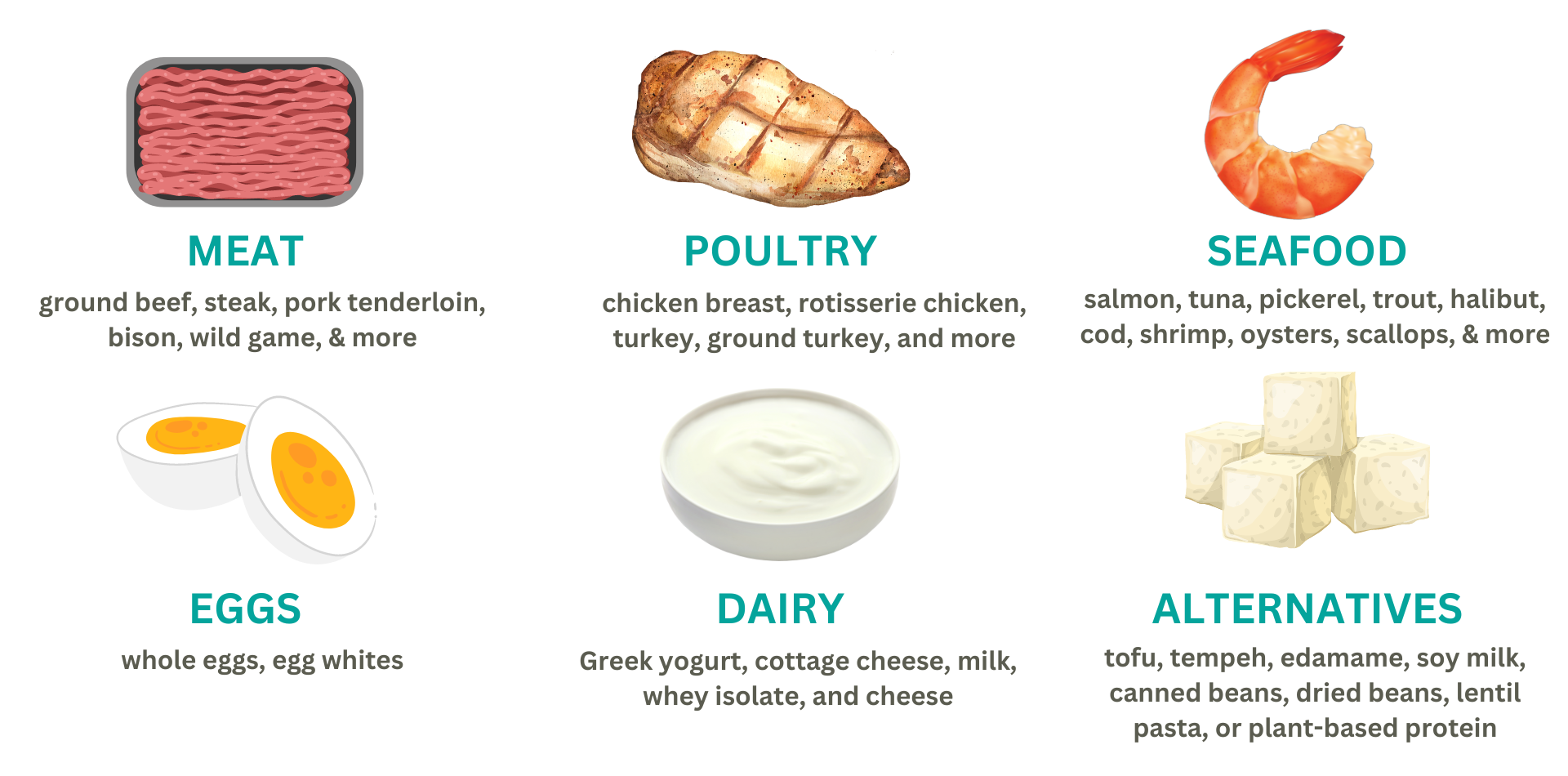
2. Hydration
“It’s still shocking to me how much I need to actively work on this. Every aspect of my life is impacted with hydration. Adding electrolytes is helpful, but at very least adding water is always key. I have found that right now 120+ oz is where I feel my best, but pre-breastfeeding it was 100+ oz so I will keep that in mind.”
Dietitian Tip: We find that most nutrition clients thrive with between 2-3L of water daily (~70-100oz) each day. Some individuals may require additional fluid. For example, breastfeeding moms, those who consume a high fibre diet, athletes, or individuals working or spending time outside in the heat.
3. Fibre & Fluid
“With fibre intake, hydration needs to come as well. I used to think adding fibre was the main importance, but I've learned that I need to pair that with hydration to prevent feeling bloated and supporting digestion.”
Dietitian Tip: An important nutrition strategy is to consume adequate fibre for the benefits of digestive health, blood sugar management, weight management, and prevention of chronic disease. Review the list of high fibre ideas below to increase your fibre intake. As our client suggested, when increase fibre intake it is important to consume additional fluids to prevent constipation, bloating, or gastrointestinal discomfort.
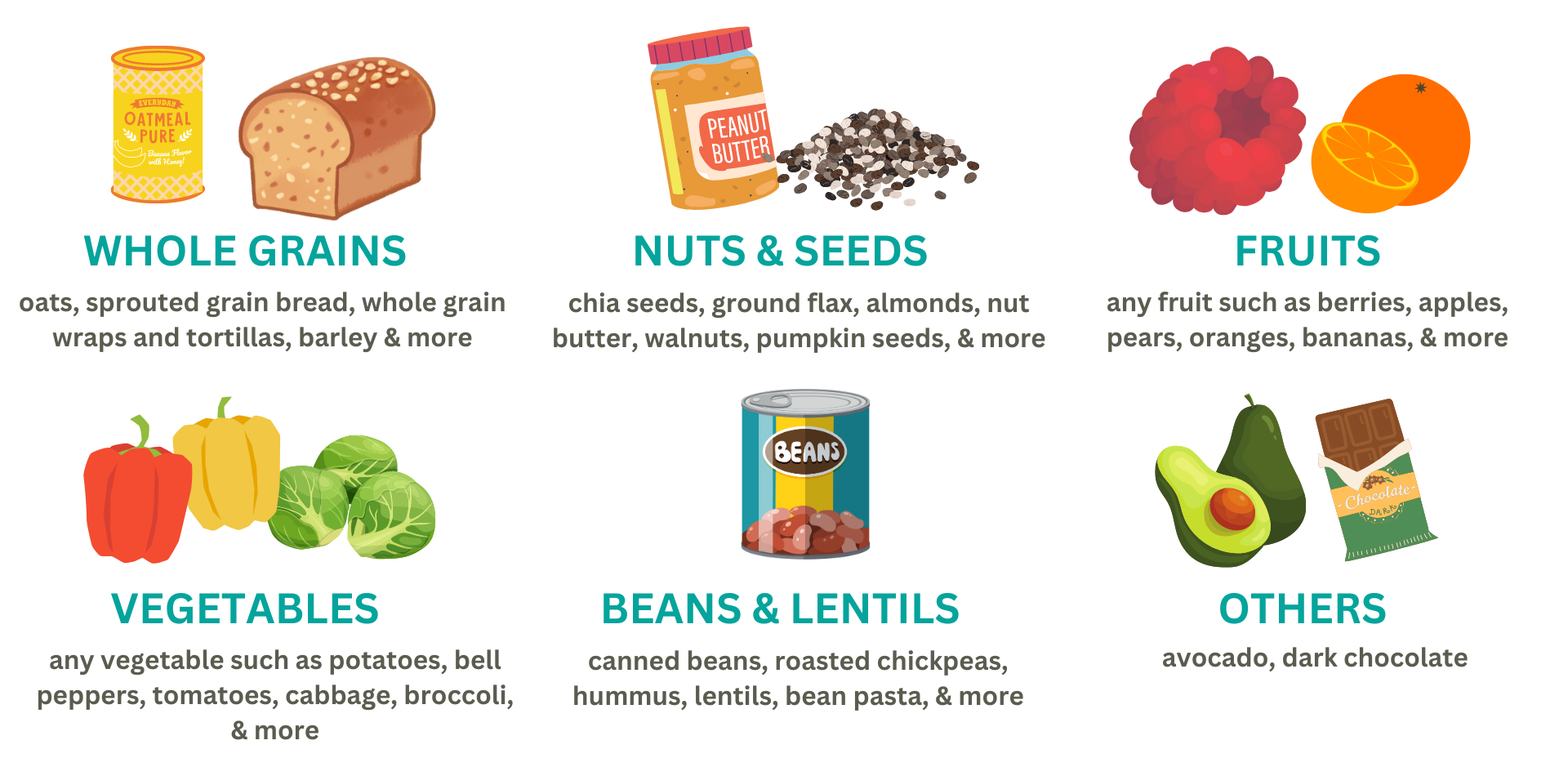
4. Consistency is Key
“I can make all the huge changes in the world, but if I can't maintain them then they are useless. I will always feel better/have more "success" with nutrition if I focus on consistency of manageable habits over the long term.”
Dietitian Tip: It is human nature to want to reach our health and wellness goals quickly! As Registered Dietitians, we can understand why a nutrition client may want to adopt more ‘extreme’ strategies to reach their goals. However, achieving most goals requires consistency and time. For example, building muscle requires consistently strength training and eating adequate protein over weeks, months, and even years. Oftentimes, focusing on the seemingly small habits (but practicing them consistently) is what allows clients to achieve extraordinary results. Therefore, it is important to consider if the habits you are adopting can be sustained. If not, it may be worth reviewing whether the approach will truly support your long term health.
5. Movement is A Pillar.
“I feel my best and my other healthy habits fall into place when I have consistent movement in my weeks. I need to thank you for telling me about Street Parking way back when, as it has been the perfect program for me. I can see myself using the program for life to be honest. I love it so much.”
Dietitian Tip: Oftentimes clients are looking to start an exercise program for the specific benefits it offers to their physical body. For example, losing body fat, building muscle, increasing strength, or improving fitness. While these are amazing benefits, as dietitians we find that some of the most impactful benefits of a regular exercise regime extend beyond the physical. Common benefits our clients report after establishing a consistent exercise regime include better body image, increased energy, better mood, improved consistency with nutrition habits, and increased confidence that they have the ability to take action on habits that support their wellness.
6. Time Outside is Another Pillar
“This is always grounding for me and a key for my mental health.”
Dietitian Tip: As Registered Dietitian, we encourage our clients to spend 15 minutes or more outside each day (ideally in the morning!) to regulate their circadian rhythm. Time outside regulates the release of cortisol during the day (to feel more awake and energized) and supports the production of melatonin in the evening (to easily fall asleep when it is time to rest).
7. Food is More Than Fuel
“My relationship with food doesn't have to be (and shouldn't be) just about fuel. I have come to appreciate the joy in food and our experiences around food.”
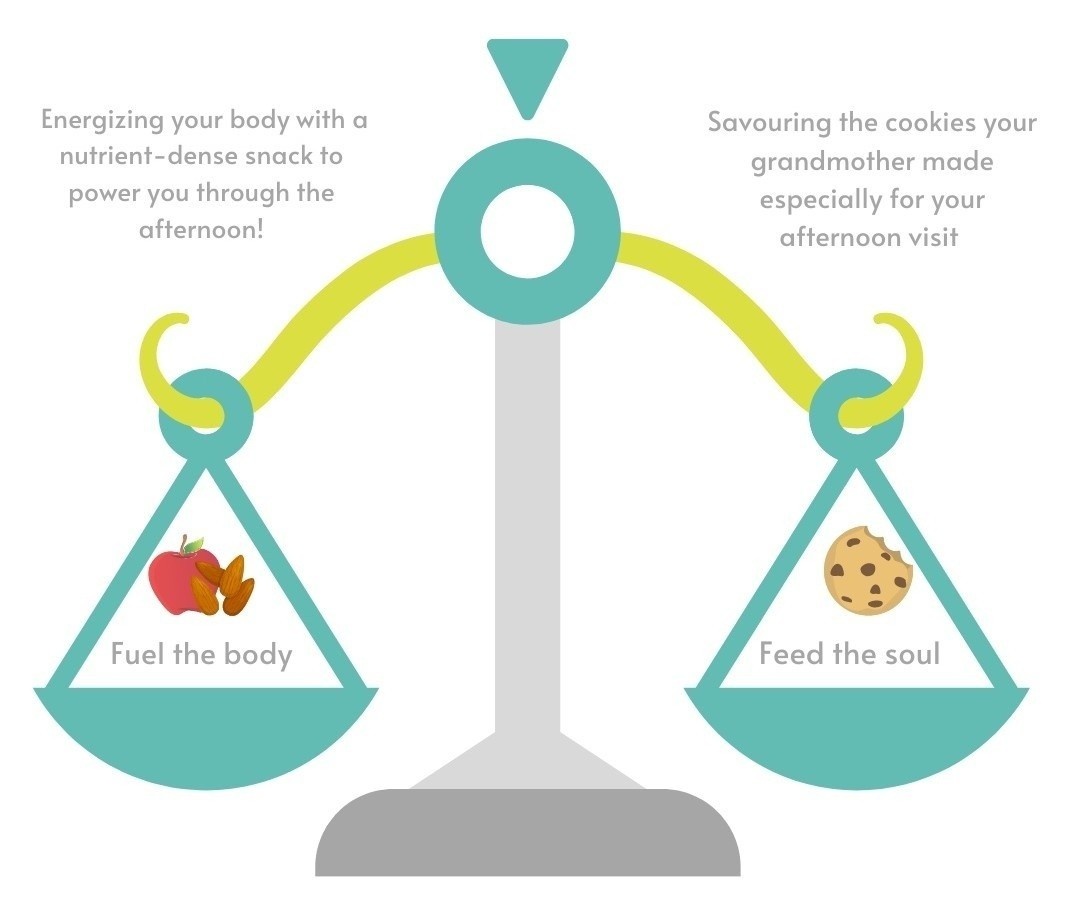
Dietitian Tip: One of our philosophies at Vitality Nutrition is “fuel the body, feed the soul.” As Registered Dietitians we appreciate the role of food as fuel for our physical body. Eating nutrient dense, balanced meals ensures that our body is supported and we create or maintain good health. However, food also connects us to people, places, memories, culture, and community. Therefore, food is more than fuel. Food can “feed the soul”, too. In our nutrition coaching program, we help clients understand their values beyond health and wellness which often include their relationship with their significant other, family, friend, or their kids. Food may also offer connect to hobbies like travel and interests like culture or simply the enjoyment or pleasure found in eating! When you understand what you value, you can create your own version of balance and know when it is time to utilize food to “fuel the body” and when it is time to enjoy food and “feed the soul.” You can read more about the “fuel the body, feed the soul” philosophy here.
8. Raising Kids Who Have a Healthy Relationship with Food
“It is really important to me to raise kid(s) to have a healthy relationship with food. I want to do everything in my power to foster healthy language around food and eating and work toward kids maintaining intuitive eating habits as they grow and change throughout life. I never want my kids to feel anxiety or fear around food and I don't want diet culture to be a thing in our house…”
Dietitian Tip: Creating confident young eaters who have a healthy mindset around food and a positive relationship with their body requires intention. As Registered Dietitians, we teach parents a framework called the “Division of Responsibility” which serves as a baseline strategy for understanding the parents’ role in deciding “what, when, and where” the child eats while allowing the child to be intuitive and decide “whether and how much” they eat. However, fostering a healthy relationship with food extends beyond the food served to the child and also includes how parents and caregivers talk about food and the body. Oftentimes parents may unintentionally pass down unsupportive narratives based on their own life experiences. One concept that parents can explore when discussing food is “food neutrality”. To learn more, we’ve linked a blog post by Sarah Remmer who is a fellow dietitian.
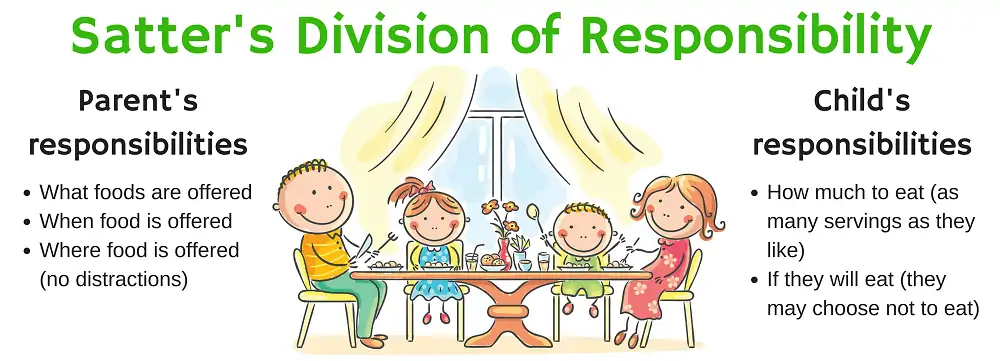
9. Modelling Healthy Habits for Children
“I want to raise kids who see me (and my husband) practicing healthy habits. I want them to see me incorporating movement in a way that makes me feel good. I want them to see me (and participate in!) preparing a variety of delicious foods and see me enjoying that with our family. I want them to see me prioritizing my own mental and physical health so that they know mom's needs are important and that they deserve to have their own needs met as they grow up. Right now I workout while my baby naps, but as he gets older and more independent I do plan to include him in movement activities whether that is hiking, biking, playing outside, sports, or even structured workouts. I want him to see a mom who finds joy in movement and does it for a range of benefits.”
Dietitian Tip: Involving children in food preparation and exercise is a fantastic strategy to spark curiosity and joy in food and movement. For example, if children are involved in preparing components of the meal (suited to their skill level) they are more likely to try the food. Furthermore, when children see parents enjoying food and movement they are more likely to join in as well.
10. Sleep is Key
“I can't summarize this easily, but sleep is key. I know I do best with 7-8 hours of sleep each night and I have a range of habits that help support that. I know I have and will continue to have seasons where sleep is less than ideal, but I know what I need to do to prioritize this when I'm able.”
Dietitian Tip: Many clients underestimate how important sleep is for their goals. Whether it is increasing energy, losing body fat, building muscle, reducing food cravings, or managing a chronic condition like diabetes. Oftentimes clients are surprised when we tell them that achieving adequate sleep is just as important as nutrition! Most adults thrive with between 7-9 hours of sleep each night. Establishing a consistent bedtime routine and fostering a supportive sleep environment are key pillars of a restorative night sleep. As Registered Dietitians, we support clients in establishing the habits and routines they need to achieve to capture the benefits of sleep!
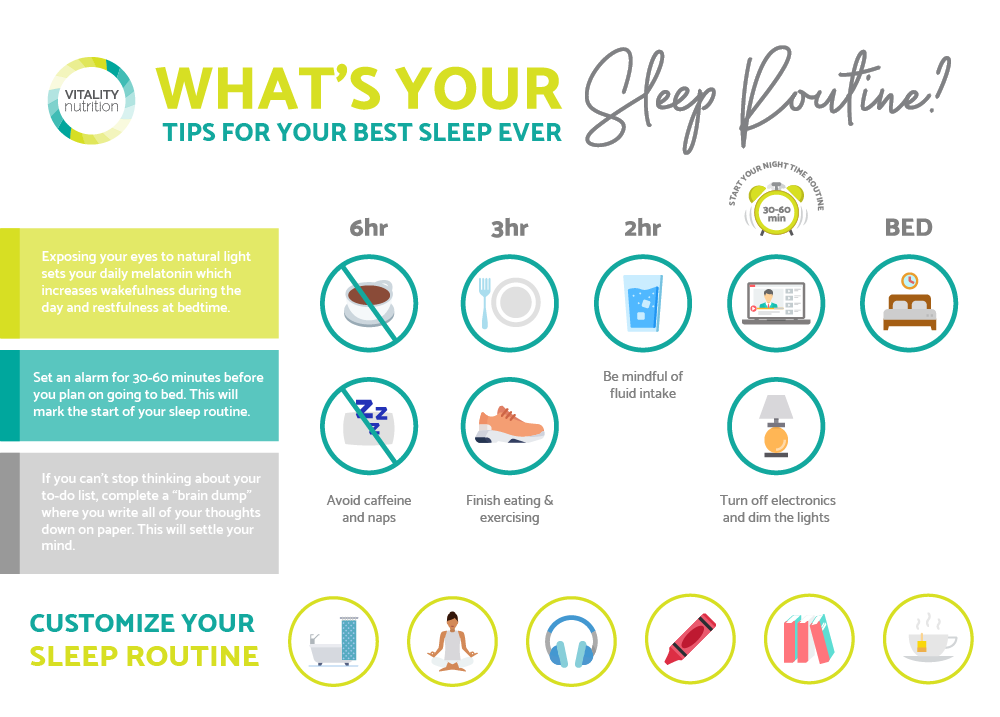
11. “Too Much Screen Time is Not Good For My Mental Health”
“I have come to understand through lots of reflecting and working with you that too much screen time, especially social media, is not good for my mental health so I am constantly working on that balance. I also continually need to monitor what I am consuming through social media and adjusting the types of accounts I follow and information I interact with.”
Dietitian Tip: In discussions with our clients working to improve body image, we have found that screen time is linked to lower body image. Therefore, one strategy for clients looking to improve their body image is to manage, reduce, or eliminate social media time. It is human nature to compare ourselves to others. Unfortunately, social media is an environment where it is easy to compare our appearance, habits, and body. Taking responsibility for screen timing and using it intentionally is one strategy to improve body image.
12. Be Before You Become
“I need to work on figuring out what type of person I want to be and making choices that align with that type of person. I have always liked this suggestion. I think I already know a lot of aspects of this, but it will help me to keep working on myself if I keep picturing the type of person I want to be so I know what daily choices to make when I am feeling a bit lost.
Dietitian Tip: “Be before you become” is a quote Dietitian Courtney often shares with her clients. This simple statement highlights the importance of “process goals.” Courtney defines process goals as the daily or weekly habits you need to adopt to achieve the result (ie. the outcome). So while it is important to have goals, the only way to reach them is to take action. Focus on the action and the results will come.
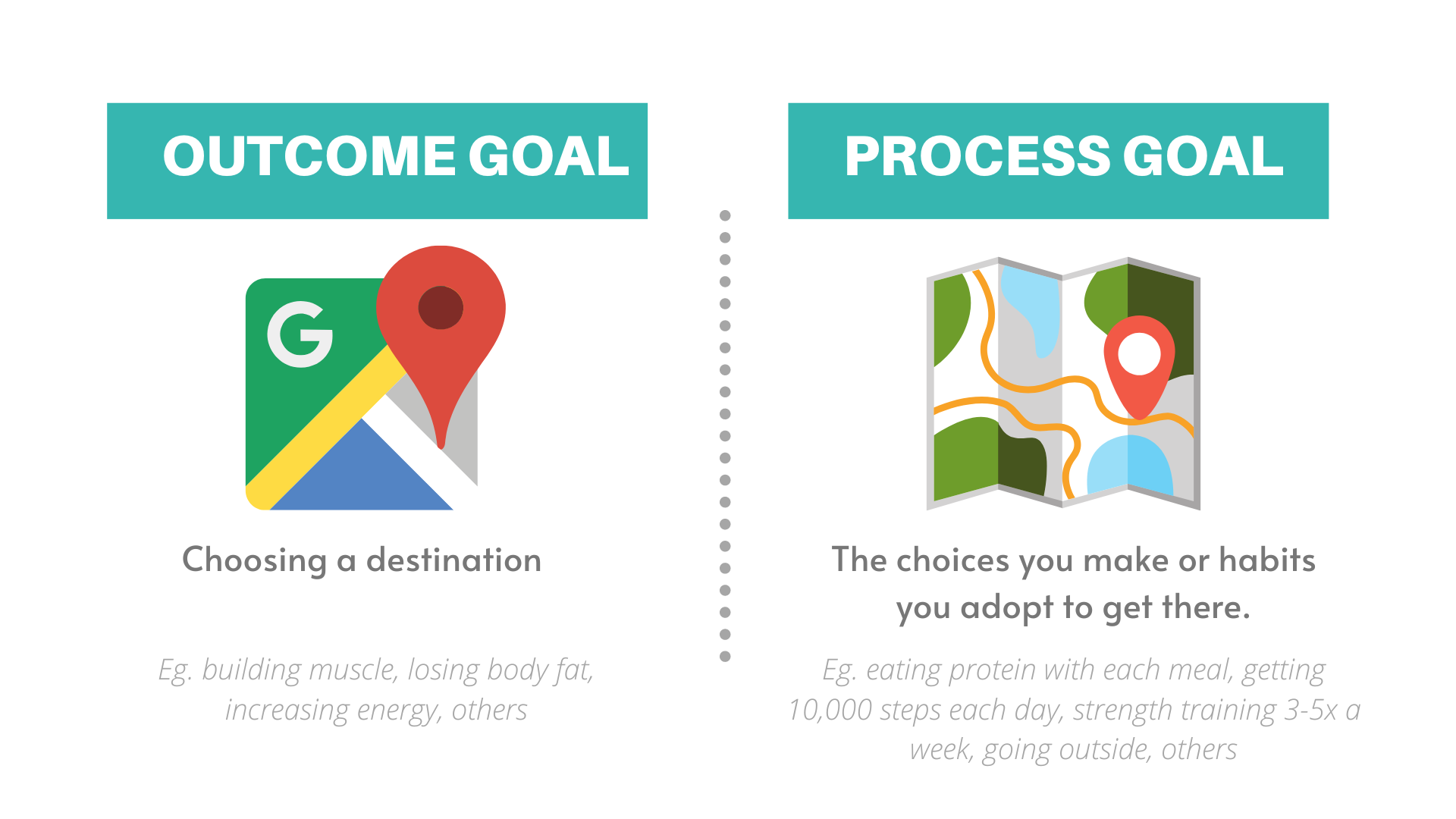
In the case of this client, one of her goals was to be leaner and have more muscle (ie. achieve body recomposition). From there, we ‘reverse engineered’ the habits or action steps she needed to take each day to achieve that result and become that person. Such habits included eating enough protein, establishing a regular exercise regime, adjusting her caloric intake via food tracking, increasing her movement through the day via walking, and capturing adequate sleep. Focusing on these actions allowed her to achieve the result over time!
13. The Division of Responsibility
“I am in control of what food I offer and when I offer; my child is in charge of if he eats and how much he eats. It is my responsibility to prepare and offer the variety and the rest is up to him… my goal as we enter toddler stages and picky eating is common from what I understand, but my goal is to keep offering the variety and letting him be in control of his consumption without me panicking or shifting what I offer him to try and coax him.”
Dietitian Tip: The parenting strategy our nutrition client reflected on is a dietitian-approved feeding strategy called “The Division of Responsibility.” This strategy was created by world-renowned dietitian, Ellyn Slatter. The Division of Responsibility changes throughout the life cycle of the child, but the base of the strategy is the principle that the parents are responsible for “what and when” the child eats and the child is responsible for “whether and how much” they eat. The parent is responsible for serving regular meals and snacks that are balanced in the food groups. The child’s responsibility of deciding if and how much they eat protects their innate intuition and encourages them to honor their hunger and fullness cues. While unique strategies may need to be considered for special cases like picky eating, the Division of Responsibility can help take pressure off both the parent and the child while fostering intuitive young eaters. Consult with a Registered Dietitian for individualized support to family nutrition strategies and planning!
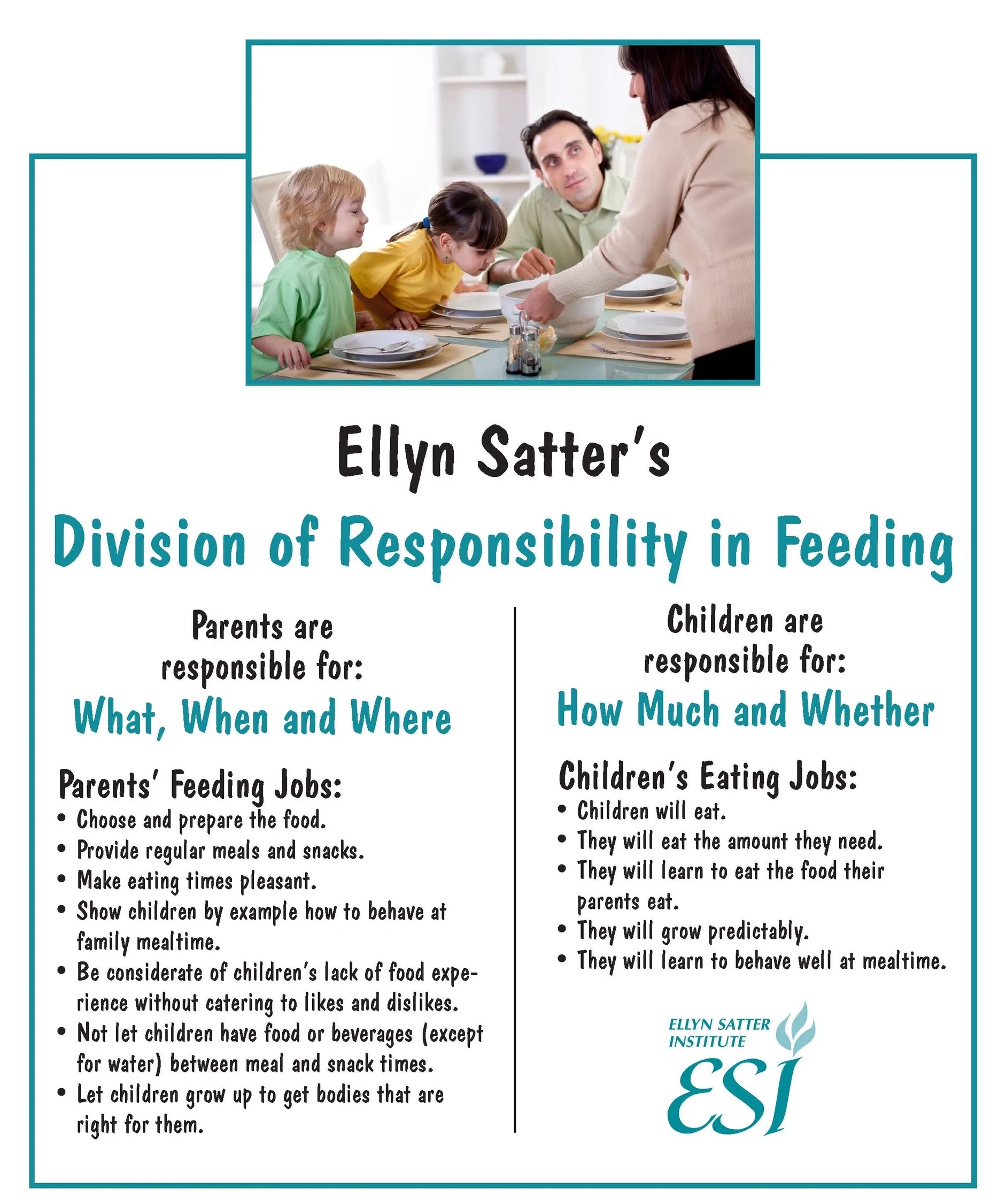
14. Don't Be Afraid of Fats in Food
“Don't be afraid of fats in food. Fats help me feel satisfied and remain full longer. Fats contribute so many benefits to my health and enjoyment of food. It's important for me to be mindful of the sources of fats and not over-consuming too consistently, but to not be afraid of it.
Dietitian Tip: Our nutrition client highlight some key benefits of fat which include slowing gastic emptying to feel full for longer alongside adding flavor and enjoyment to meals. We encourage our clients to consider adding fats to their main meals for the unique benefits this food group offers.
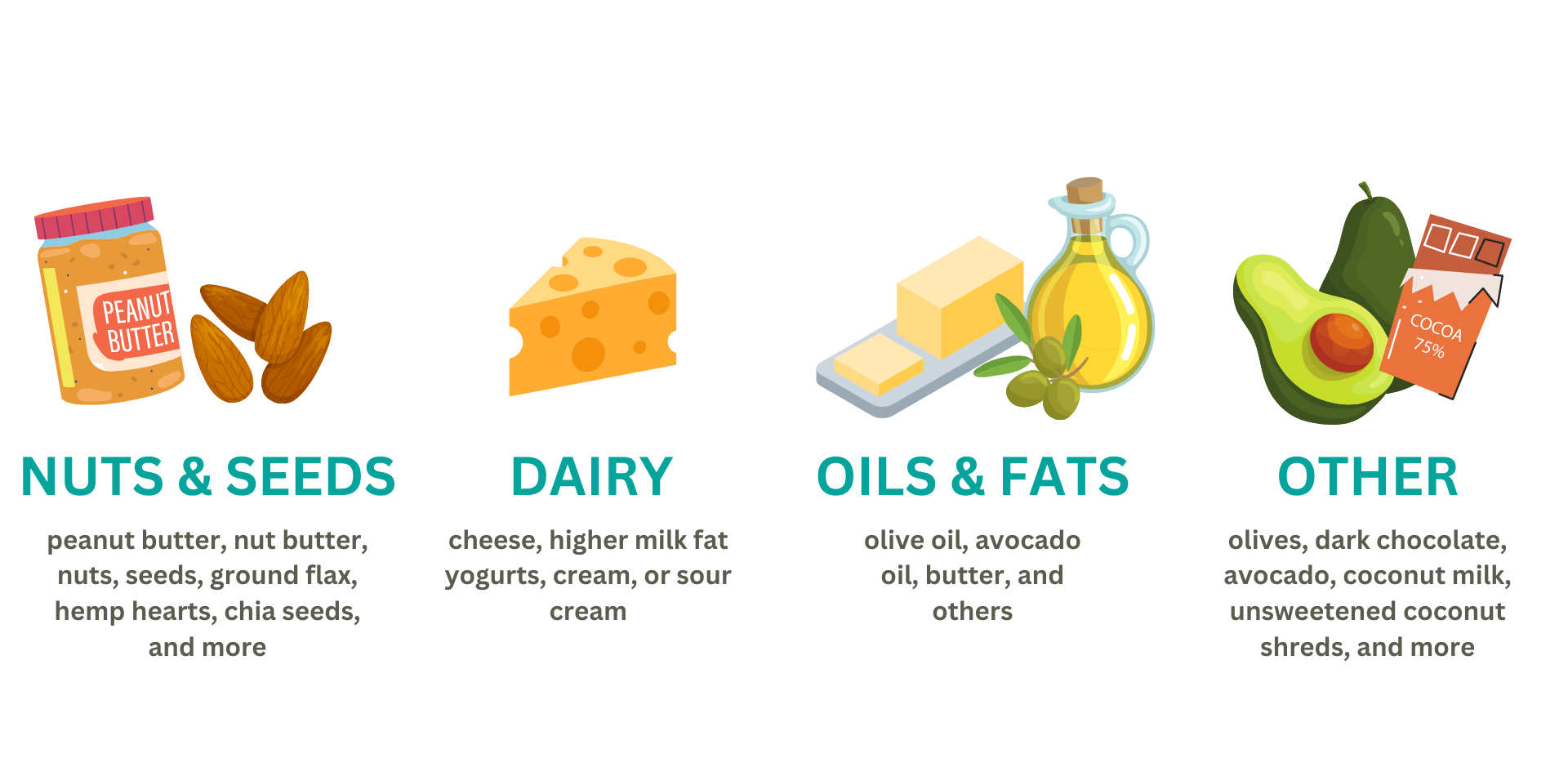
15. Food Tracking
“Tracking food can be such a powerful tool, but I know I can't get too consumed with it long term.”
Dietitian Tip: Food tracking can be a strategy to build knowledge of food and nutrition and awareness of your personal intake. For some clients, it may be appropriate to track food to learn about nutrition or make strategic adjustments to their intake for their unique goals. However, as our client shared, tracking often isn’t a long-term strategy and food tracking may even be detrimental if it is becoming obsessive, consuming, or distracting from the habits that will truly support wellness over the long-term as well as a healthy relationship with food.
16. Tuning into The Body
“It will always be helpful to take a step back and just try to observe and notice my body's hunger, thirst, fullness, etc. cues. I have been able to identify these before and they tend to get lost in crazy seasons of life, but I know my body communicates needs when I take the time to pay attention.”
Dietitian Tip: Recognizing body cues can take awareness and practice. For example, hunger does not always present as a growling stomach. It can also be low energy, constant thoughts about food, disruptions in mood or sleep, and more. As Registered Dietitians we empower our clients with the knowledge to understand their body (including metabolism, hunger, and thirst) so they can listen to and trust their body cues.
17. Volume Food!
“Also a hugely life altering habit that you supported me with. When all else fails, I will always add volume food to meals and snacks.”
Dietitian Tip: At Vitality Nutrition, we highlight “volume foods” as a food groups which we described as vegetables and berries. These foods are low in energy (calorie) density but rich in vitamins, minerals, fibre, water, and volume. They are nutritious and add ‘volume’ to our meals to help us feel more full while controlling the caloric content of the meal. While everyone benefits from adding volume foods to the meals, some individuals may benefit from adding more or less depending on their personal goals (eg. weight maintenance/gain versus weight loss).
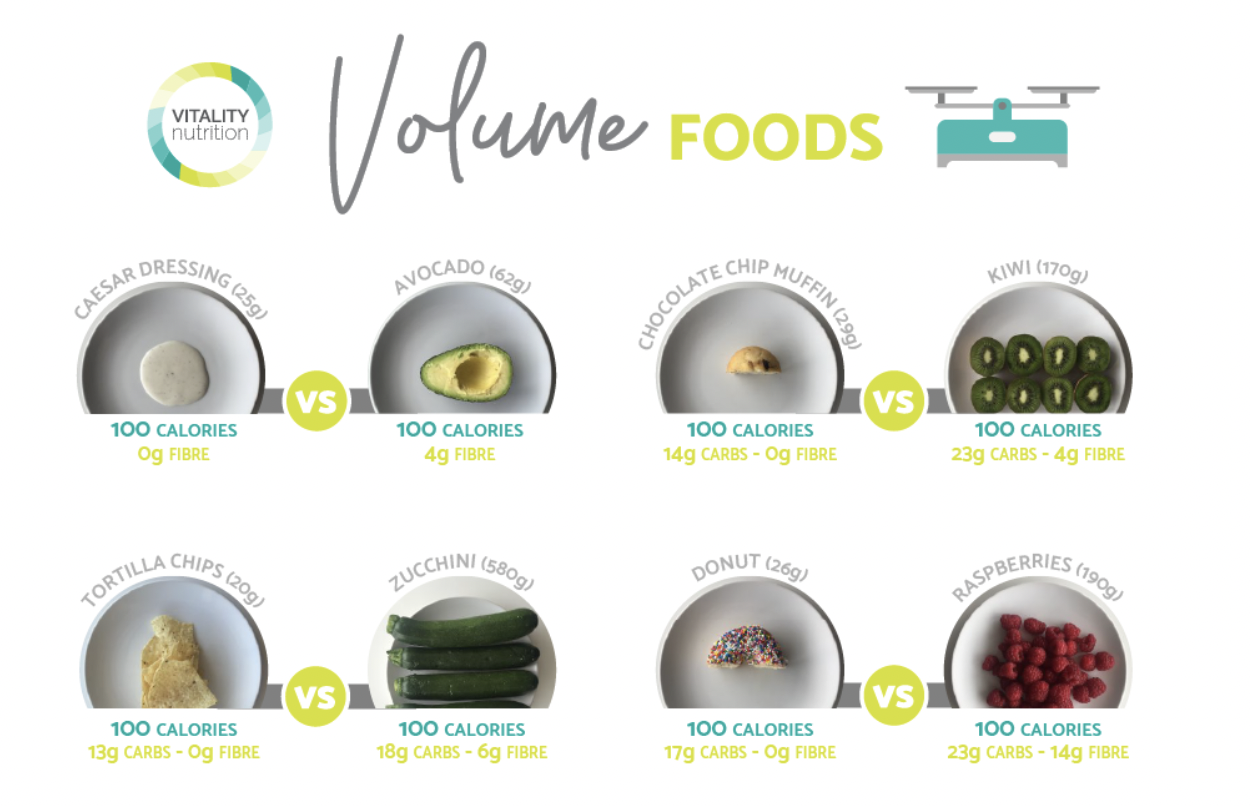
18. Fundamental Four
“This is such an easy/manageable approach to building meals and snacks. I constantly find myself thinking of the 4 categories when I'm building meal plans and know this will be a habit I can use until the end of time haha.”
Dietitian Tip: The Fundamental Four (F4) is a 4-step framework we teach our nutrition clients to help them understand the role of each food group and how to strategically design balanced meals to reach their goals. After learning about the ingredients that fall into each group, it becomes a quick check-list that clients utilize to emphasize what can be added to the meal to make it balanced. You can learn more about the strategy in our online course here.
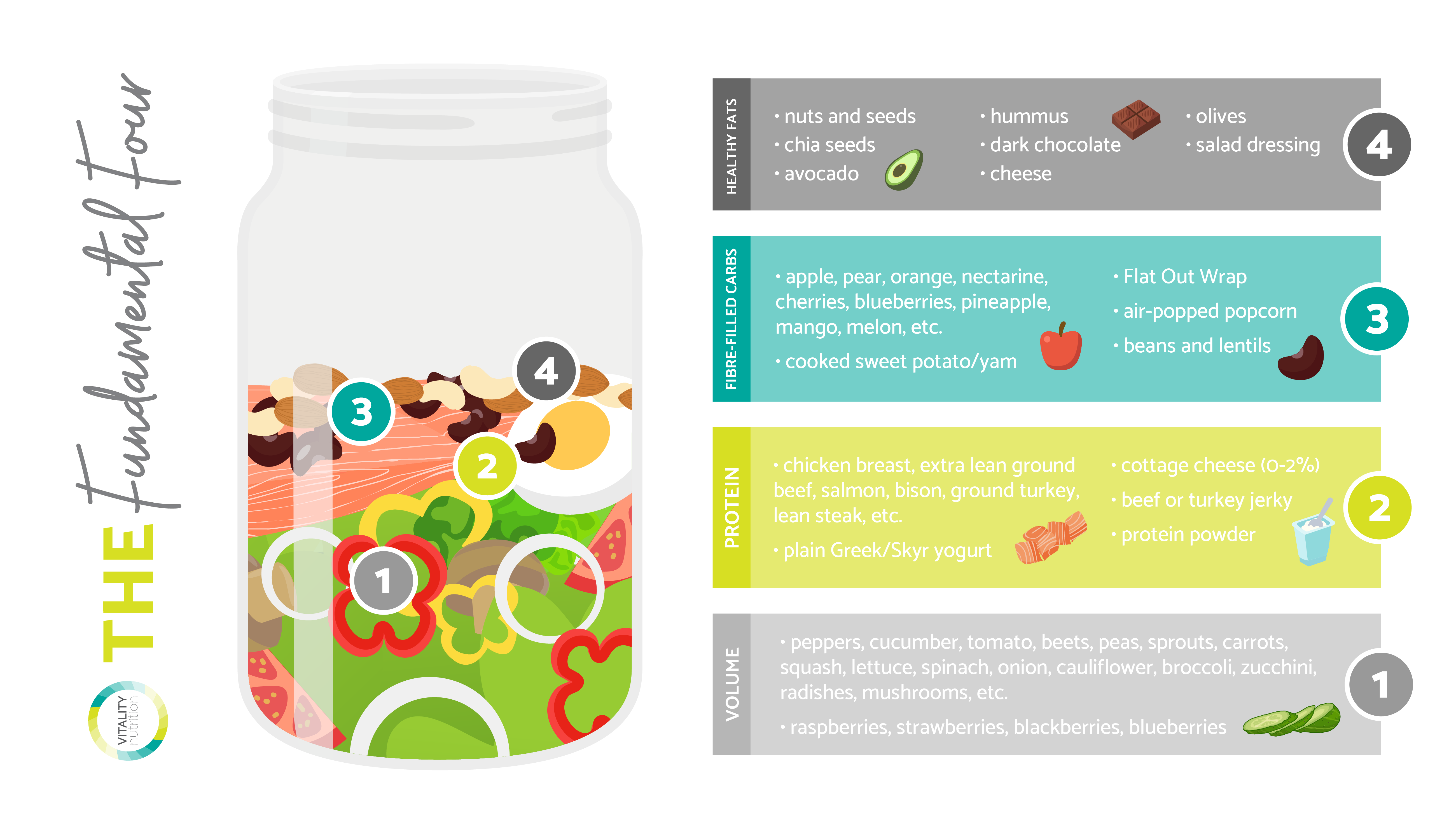
19. Creating a Supportive Environment
“The importance of setting up your environment for the choices you want to make regularly. For me this means having healthy items prepped and accessible and less nutrient dense items less accessible. This also includes batch prepping and meal prepping to reduce daily work throughout the weeks. This also includes my workout space being accessible.”
Dietitian Tip: When supporting our nutrition clients in reaching their goals and developing new habits, we have them reflect on how they can strategically set up their environment to make good habits easier. One strategy to cultivate a supportive environment is to create cues that remind you to take action on good habits. For example, if you want to eat more vegetables then you can have them prepped at eye level in the fridge so you see them and eat them. If you want to drink more water, you can leave a water bottle at your bedside table or desk as a reminder to drink. If you want to remember to take your supplements, you can leave them beside your toothbrush so you see them and remember to take them! Creating cues in the environment is one of many strategies we recommend to our nutrition clients!
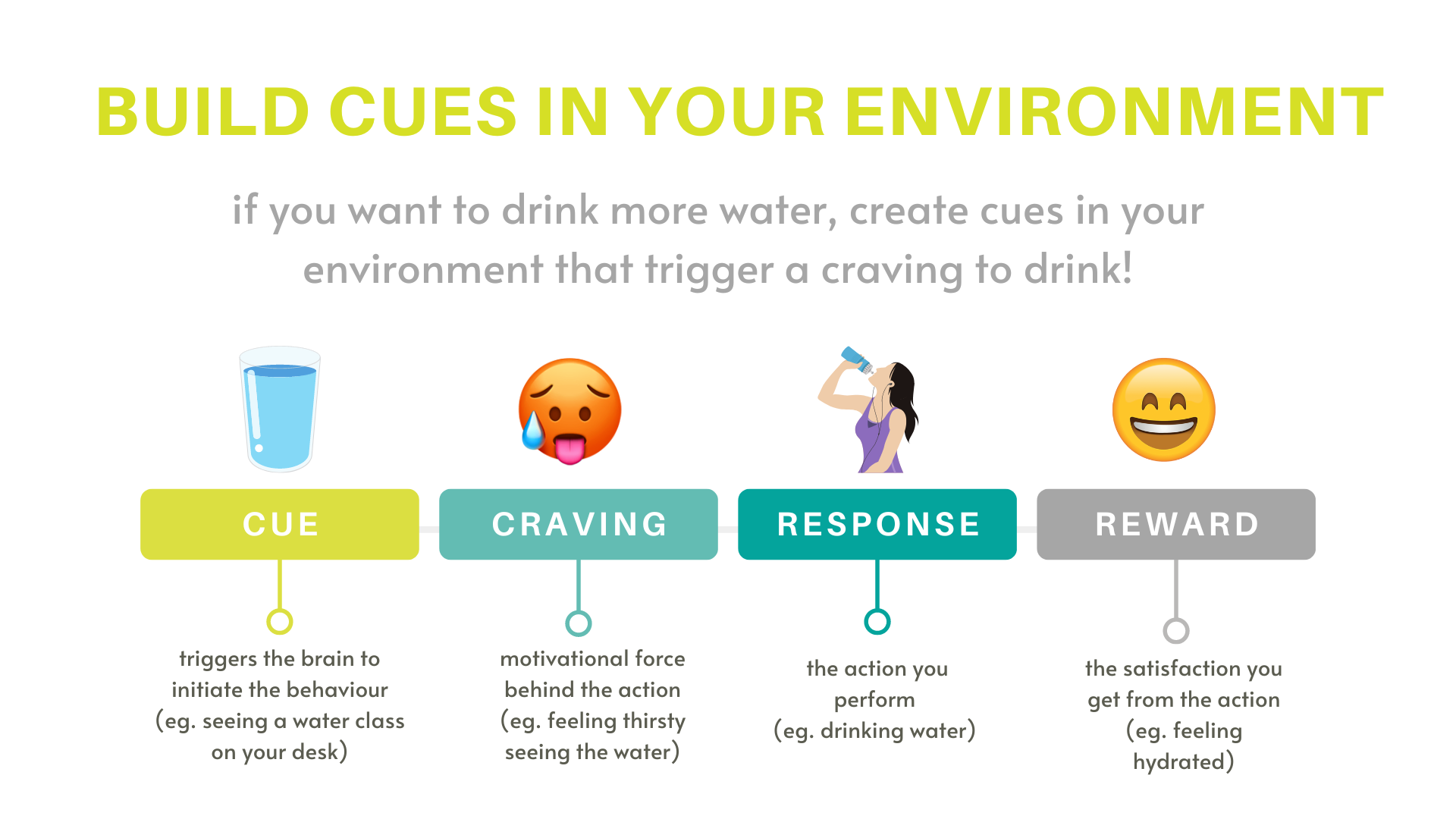
20. Food Isn't Good or Bad
“Food isn’t good or bad. They just have different roles. There are all the time foods and sometimes foods and they’re all important. “
Dietitian Tip: Our nutrition client does a beautiful job of highlighting the importance of detaching morality from food. Food plays different roles and we can hold space to enjoy foods for a variety of reasons. Most of the time we may choose foods that physically fuel and nourish the body. However, we may also intentionally choose foods for pleasure, connection, celebration, and comfort. Oftentimes finding a more trusting relationship with food requires that we shift our mindset. Many of our clients have shared that they are initially scared to embrace a wide variety of foods for fear they will ‘lose control’ of their choices. However, as Registered Dietitians, we find the opposite to be true. Holding space to enjoy foods for reasons (beyond physical fuel!) allows our clients to create consistency and feel ‘in-control’ of their choices by ditching food guilt and finding a balance between nourishment and enjoyment.
Take Action
If you are looking to get started with in-person or virtual nutrition coaching to reach your unique goals then we invite you to book directly online or contact us via our form to share more about your goals. From there, we will match you with a Registered Dietitian who is the best fit to support you!
Ready to bring the evidence-based nutrition support of our Registered Dietitians into your kitchen?
Hungry for more?
Get recipes, tips, and updates from the Vitality Nutrition team straight to your inbox!
Don't worry, your information won't be shared.

